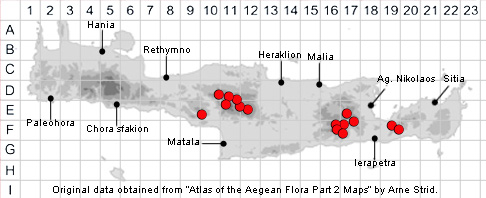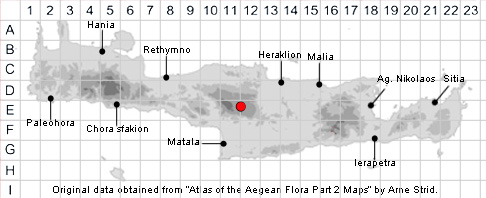SPECIES DESCRIPTION
ASTRAGALUS CRETICUS subsp. CRETICUS
Including Astragalus dolinicola
Family and Genus:- See- LEGUMINOSAE/Subgen. TRAGACANTHA
Common Name:- None
Homotypic Synonyms:- Astracantha cretica
Meaning:- Astragalus (Gr) Ankle-bone, (a plant with knotted roots).
Creticus (L) From Crete.
General description:- A perennial shrub with a low-habit, hummock-shaped and
with many branches.
Stems;-
1) Up to 30 cm, tall.
Leaves:-
1) Imparipinnate, with a stout rhachis protracted into a yellowish spine.
2) Leaflets, 4-7 pairs, 3-7(-9) mm, narrowly elliptic-obovate, densely pubescent with
straight, erecto-patent, simple white hairs.
Flowers:-
1) In dense clusters just below the branch tips.
2) Calyx, 6-9 mm, the teeth slightly shorter than or almost as long as the tube;
completely hidden in dense, white wool, usually splitting to the base in fruit.
3) Bracts, navicular, lanceolate; bracteoles, absent.
4) Corolla, pinkish or occasionally cream; standard, 10-l5 mm, limb, oblong,
sometimes slightly constricted in the middle, with rounded auricles at the base.
Fruit:-
1) Legume, c. 5 mm, narrowly ovoid, densely white-tomentose, single seeded.
Key features:-
1) Standard, with rounded auricles at the base of the limb.
2) Terminal spine of the leaf much longer than the terminal pair of leaflets.
3) Leaflets, sparsely hairy or glabrescent.
Habitat:- Dry rocky slopes. (700-)1400-2300 m. generally on limestone, sometimes
a dominant constituent of thorncushion vegetaion.
Distribution:- Cretan Endemic. Confined to the three main massifs, where it is
locally common. Absent from Lefka Ori.
Flowering time:- End of June to mid-Aug.
Photos by:- Steve Lenton
ASTRAGALUS DOLINICOLA
Homotypic Synonyms:- Astracantha dolinicola
Meaning:- Dolinicola (L) Probable reference to it's habitat - doline bottoms.
Resembling Astracantha cretica, but differering in the following characters
1) Leaves, green, sparsely hairy.
2) Calyx, c. 10 mm, glabrous below, with dense hairs c. 1 mm long in remaining
part, not hidden by indumentum.
3) Corolla, somewhat larger (standard 15-16 mm), pink with purplish veins.
4) Legume, 6.5-7 mm.
Habitat:- Dolines among limestone outcrops, with deep, compressed, basic soil
rich clay. 1400-1500 m.
Distribution:- Rare Cretan Endemic. Confined to the Psiloritis massif.
Flowering time:- Probably from mid-May to end of June.
Photos by:- Fotis Samaritakis
~~~~~~~~~~~~~~~~~~~~~~~~~~~~~~~~~~~~~~~~~~~~~~~~~~~~

